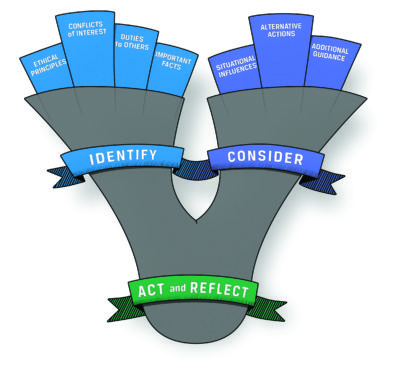Ethics in Practice: Mortgage-Backed Securities Credit Ratings. Case and Analysis–Week of 14 January
Check out the analysis to see how you did in analyzing this week’s case (14 January) and determining which CFA Institute Standard was involved.
Case
Dukes is a managing director at a global credit ratings service. She leads and is responsible for the actions of the group that assigns new issue and surveillance credit ratings to commercial mortgage-backed securities. To determine the ratings, Dukes and her group calculate the debt service coverage ratio (DSCR) of each security, a key quantitative metric used to rate commercial mortgage-backed securities. Shortly after the global financial crisis, the ratings agency changed the methodology for calculating the DSCR for certain securities. Dukes’ group published future credit ratings without disclosing the change. Using the new methodology, the securities received higher credit ratings than they would have received if the original methodology had been used. Dukes’ actions are
- inappropriate because she did not have a reasonable and adequate basis for changing the methodology.
- appropriate because the new methodology more accurately reflects risk.
- inappropriate because she did not disclose the change in methodology to the investing public.
- appropriate because no disclosure is necessary because calculating DSCR is only one element in determining the overall rating of the security.
- none of the above.
Analysis
This case involves the ethical principles applicable to communication with investors. CFA Institute Standard V(B): Communication with Clients and Prospective clients requires CFA Institute members to disclose to investors the basic format and general principles of the investment process they use to analyze investments and promptly disclose any changes that might materially affect those processes. Rating agencies’ consistency and transparency are important to investors. Without the consistent application of rating methodologies, ratings may not be readily comparable. Similarly, without transparency, investors can neither assess the methodologies used by the credit ratings agency nor the application of those methodologies, and thus cannot determine what weight to give the rating. Dukes should have disclosed to investors the change in methodology for calculating DSCR.
Although it would be inappropriate to change the methodology without a reasonable and adequate basis, the facts do not indicate that Dukes failed to use diligence or have a reasonable basis for the change. In addition, the facts do not indicate whether the new methodology more accurately reflects risk; however, even if the new methodology does more accurately reflect risk, the change still must be communicated to investors. DSCR is clearly a “key quantitative metric” used to rate the securities because the change in methodology materially affected the credit ratings by moving them higher than the original method. Choice C is the best answer
This case is based on a December 2018 enforcement action by the US SEC.
Let us know what you think of Ethics in Practice by taking this short survey.
Have an idea for a case for us to feature? Send it to us at [email protected].
More About the Ethics in Practice Series
Just as you need to practice to become proficient at playing a musical instrument, public speaking, or playing a sport, practicing assessing and analyzing situations and making ethical decisions develops your ethical decision-making skills. The Ethics in Practice series gives you an opportunity to “exercise” your ethical decision-making skills. Each week, we post a short vignette, drawn from real-world circumstances, regulatory cases, and CFA Institute Professional Conduct investigations, along with possible responses/actions. We then encourage you to assess the case using the CFA Institute Ethical Decision-Making Framework and through the lens of the CFA Institute Code of Ethics and Standards of Professional Conduct. Then join the conversation and let us know which of the choices you believe is the right one and explain why. Later in the week, we will post an analysis of the case and you can see how your response compares.
Image Credit: ©CFA Institute


I will choose option number ‘c’.
Because as mentioned, DSCR is a ‘key’ quantitative metric, used to rate commercial mortgage backed securities. Hence change in methodology of calculation in DSCR should have been disclosed. Because the change in methodology also has an added impact -positive/negetive- on the said securities, unlike previously, with the old method – which I find safe to assume is a method known and public to all.
Also my opinion was formed on the very knowledge that I received by reading the case itself. I would like to see the real solution to this case and judge my opinion based on that.